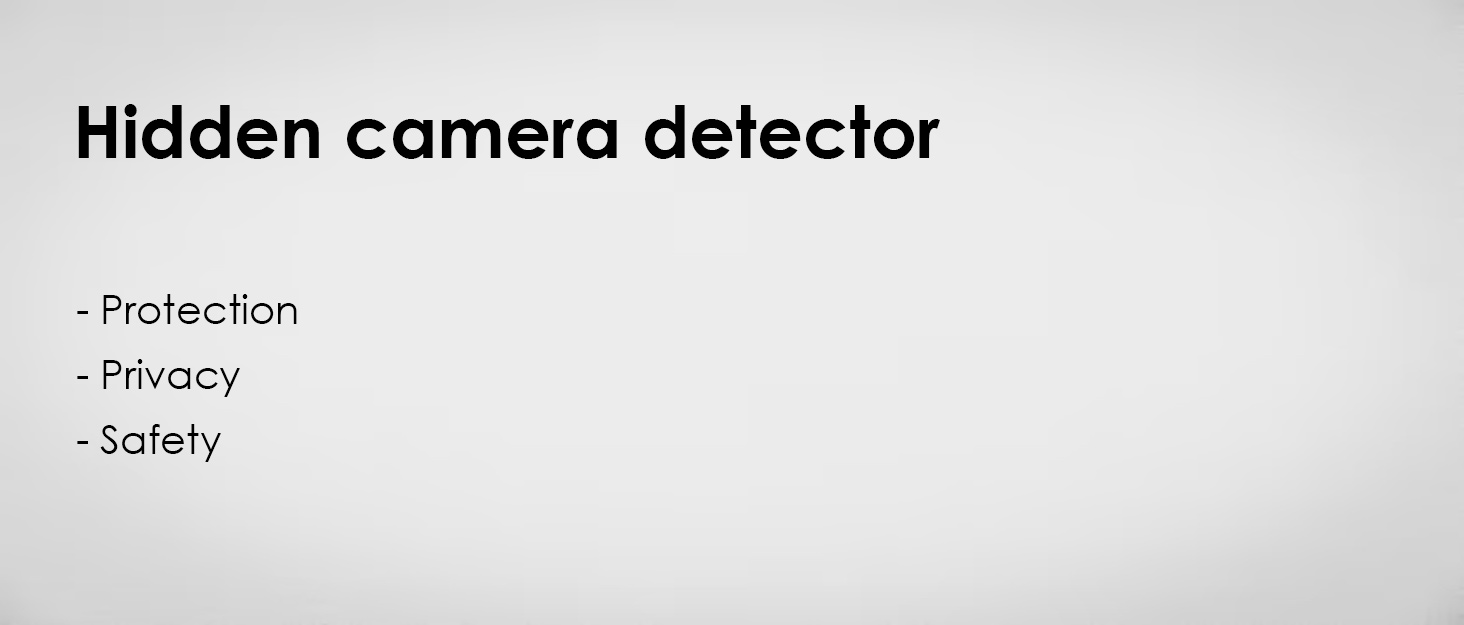In today’s increasingly interconnected world, privacy concerns are at an all-time high. For businesses, safeguarding sensitive information and ensuring employee safety is paramount. While many focus on cybersecurity threats and physical security measures like locks and alarms, a critical area often overlooked is the potential for hidden cameras. This is where investing in hidden camera detectors becomes a smart, proactive move, significantly bolstering your overall security posture. This article delves into the crucial reasons why businesses of all sizes should prioritize the detection and prevention of covert surveillance.
The Growing Threat of Hidden Cameras

Hidden cameras, often disguised as everyday objects, pose a significant threat to businesses. Their discreet nature makes them incredibly difficult to detect without specialized equipment. Malicious actors could be motivated by various reasons, including:
- Industrial Espionage: Competitors might use hidden cameras to steal trade secrets, designs, or manufacturing processes.
- Data Breaches: Confidential client data, financial records, and strategic plans can be compromised through hidden cameras.
- Employee Monitoring Abuse: While some employee monitoring is permissible with transparency and legal compliance, hidden cameras can be used for unethical surveillance, violating employee privacy rights.
- Extortion and Blackmail: Footage captured by hidden cameras could be used to blackmail employees or the business itself.
- Insurance Fraud: Staging accidents or incidents to defraud insurance companies is another potential misuse.
The consequences of a successful hidden camera breach can be devastating, leading to financial losses, reputational damage, legal battles, and even criminal prosecution. The cost of mitigating these consequences far outweighs the cost of investing in preventative measures.
Why Invest in Hidden Camera Detectors? Proactive Security is Key

A reactive approach to security – dealing with a breach after it’s occurred – is always more expensive and damaging than proactive measures. Hidden camera detectors allow businesses to take control of their security, preventing breaches before they happen. Here’s how:
- Early Detection: Detectors pinpoint hidden cameras, giving businesses the opportunity to remove the threat before any sensitive information is compromised.
- Peace of Mind: Knowing you’ve taken steps to protect your business from covert surveillance provides a significant sense of security for employees and management alike.
- Strengthened Security Posture: Integrating hidden camera detectors into your overall security strategy demonstrates a commitment to protecting valuable assets and confidential information.
- Compliance and Legal Protection: In many jurisdictions, there are strict laws governing employee surveillance. Using hidden camera detectors demonstrates a commitment to legal compliance.
- Cost-Effective Prevention: The cost of a hidden camera detector is significantly less than the potential costs associated with a data breach or other security incident.
Types of Hidden Camera Detectors and Their Capabilities
The market offers a range of hidden camera detectors, each with varying capabilities and price points. Some common types include:
- RF (Radio Frequency) Detectors: These detectors identify the radio waves emitted by wireless cameras. They are effective but may not detect cameras using wired connections or sophisticated encryption.
- Lens Detectors: These devices use a combination of infrared (IR) light and a lens detection system to identify the reflective properties of camera lenses. They are effective at finding both wired and wireless cameras.
- GPS Detectors: Though less directly related to cameras themselves, these detectors can help uncover tracking devices, which could be used in conjunction with hidden cameras.
- Combined Detectors: Many detectors offer a combination of RF, lens, and even magnetic field detection, providing comprehensive surveillance detection capabilities.
Choosing the Right Detector for Your Business

Selecting the appropriate hidden camera detector depends on your specific needs and budget. Consider the following factors:
- Size and Scope of Your Business: A small business might require a less sophisticated detector, while a large enterprise may benefit from a more advanced, multi-functional device.
- Budget: Detectors range in price, so it’s crucial to set a realistic budget before beginning your search.
- Technical Expertise: Some detectors are easier to use than others; choose one that matches your team’s technical proficiency.
- Specific Threats: Consider the types of threats you are most concerned about (e.g., wireless cameras, wired cameras, GPS trackers) when selecting a detector.
Beyond Detection: A Holistic Approach to Security

Investing in hidden camera detectors is just one part of a comprehensive security strategy. Consider these complementary measures:
- Regular Security Audits: Conduct periodic security checks to identify vulnerabilities and potential hiding places for cameras.
- Employee Training: Educate your employees about the risks of hidden cameras and how to report suspicious activity.
- Access Control: Restrict access to sensitive areas of your business to authorized personnel only.
- Cybersecurity Measures: Strengthen your network security to prevent unauthorized access and data breaches.
In conclusion, the potential consequences of hidden cameras are too significant to ignore. Investing in a hidden camera detector is a proactive step that demonstrates your commitment to security and privacy, safeguarding your business from substantial financial and reputational risks. By combining detection technology with other security measures, you can create a robust and effective security system, protecting your business and its valuable assets.